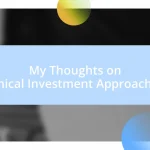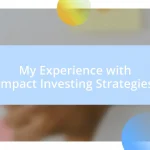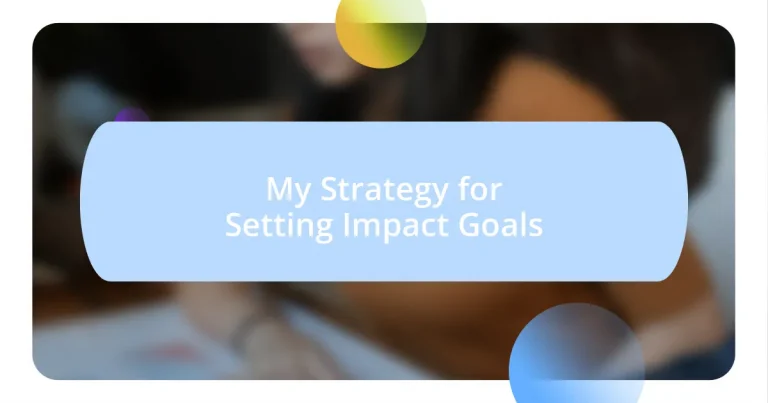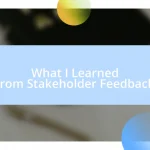Key takeaways:
- Impact goals should resonate with personal values and be specific, measurable, and action-oriented to drive meaningful change.
- Reflecting on long-term visions and celebrating small achievements fosters motivation and clarity during challenges.
- Regularly monitoring progress and adjusting strategies based on feedback enhances community engagement and overall effectiveness.
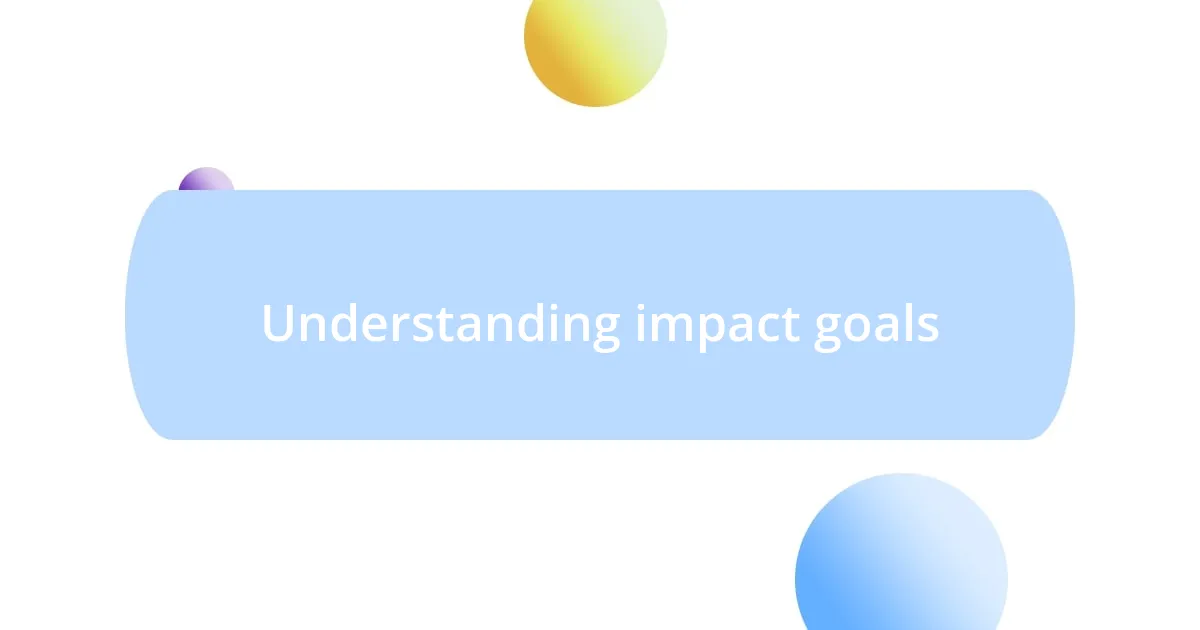
Understanding impact goals
Impact goals are more than just vague aspirations; they define the measurable difference you want to make in the world. When I first began setting my own impact goals, I realized they must resonate with my values and passions. Have you ever noticed how powerful a clear goal can feel? It’s like having a compass guiding you through life’s complexities.
Understanding impact goals requires reflection on what truly matters to you. For instance, I once set a goal to improve community literacy after witnessing the struggles of a friend who couldn’t read. This experience ignited a deep desire in me to create change, and that goal has continuously fueled my actions and decisions ever since. How does your past shape your vision for impact?
Further, these goals should be specific and action-oriented, giving you a clear path to follow. I remember when I quantified my literacy goal by committing to volunteer hours each week at a local reading program. This specific approach not only monitored my progress but also made me feel more connected to my community. Isn’t it amazing how concrete steps bridge the gap between intentions and real-world effects?
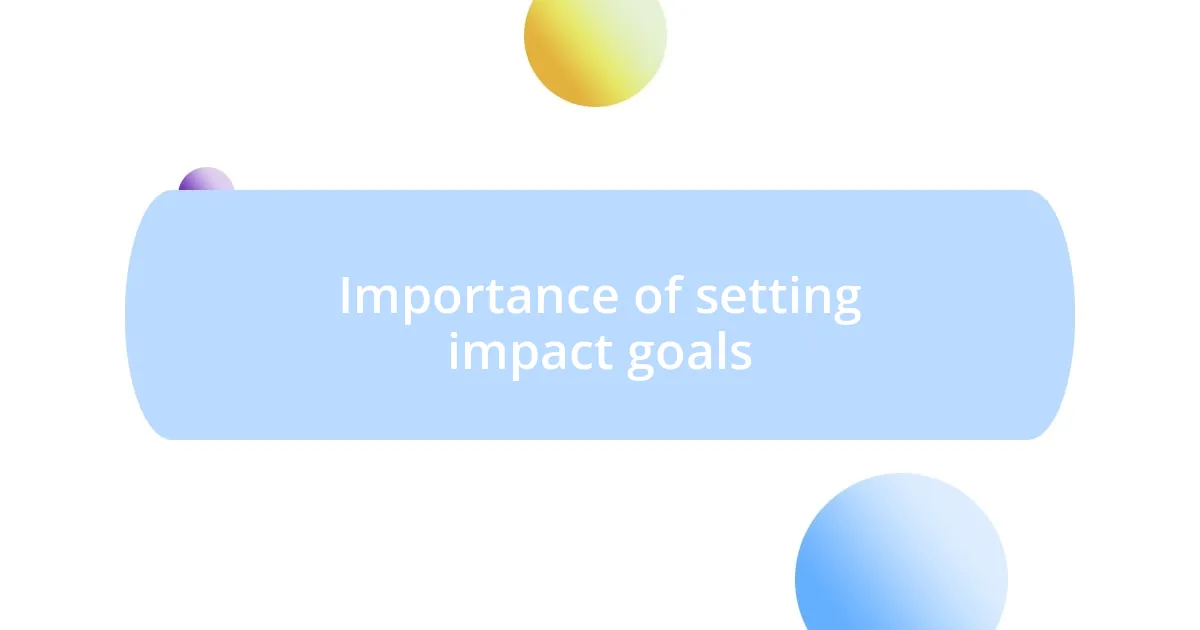
Importance of setting impact goals
Setting impact goals is essential because they transform our intentions into tangible outcomes. I’ve found that a clear impact goal not only clarifies my purpose but also ignites motivation. For instance, when I aimed to reduce plastic waste in my community, it was more than just a desire; it became a commitment that guided my daily choices and conversations. Suddenly, every small action—like carrying a reusable bag—felt significant, reinforcing my dedication to environmental issues.
- Clarity: Impact goals offer a clear vision of where you want to go, making it easier to navigate challenges along the way.
- Accountability: They hold you accountable, as you can measure your progress and adjust your actions based on the outcomes.
- Connection: Setting these goals helps build deeper connections with like-minded individuals who share your vision and can support each other.
- Sustainability: When your goals align with your values, you create lasting commitments that transcend momentary enthusiasm.
It’s fascinating how each of these elements contributes to a sense of fulfillment and purpose, pushing us to rise above mere intentions.
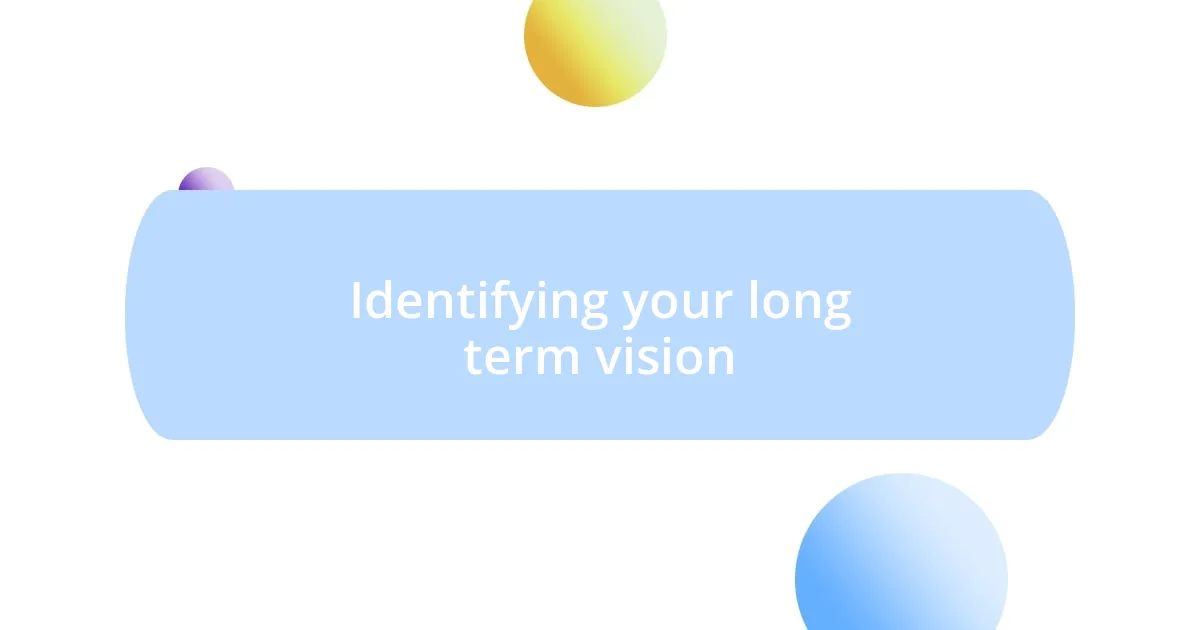
Identifying your long term vision
Identifying your long-term vision is an essential step in shaping your impact goals. I often encourage people to envision their future self and the legacy they wish to leave behind. For me, this became evident when I realized that my vision was to create a more inclusive community for those with disabilities. I pictured the vibrant interactions that could occur if everyone felt welcomed and valued. This imagery guides my decisions, making it easier for me to focus on initiatives that align with this vision.
As I explored my long-term aspirations, I found journaling to be an invaluable tool. Writing down my thoughts and feelings helped clarify what truly mattered. I remember a moment when I penned my hopes for mentoring youth in my community. That act alone illuminated my commitment and passion for fostering growth in others. It’s intriguing how such an act of reflection can set the stage for a more defined direction in life.
Having a well-defined long-term vision also helps during times of uncertainty. When challenges emerge, it’s easy to feel lost, but I remind myself of my core vision. For instance, during a particularly tough week in my advocacy for mental health awareness, I looked back at my long-term goal of breaking the stigma surrounding mental illness. This reflection reignites my passion and keeps me moving forward, even when the path gets rocky. How can your long-term vision provide stability during life’s unpredictability?
| Aspect | Importance |
|---|---|
| Clarity of Purpose | Enables focused efforts toward meaningful change. |
| Emotional Connection | Fosters personal investment in your goals. |
| Guidance During Challenges | Serves as a reminder of your “why” in difficult times. |
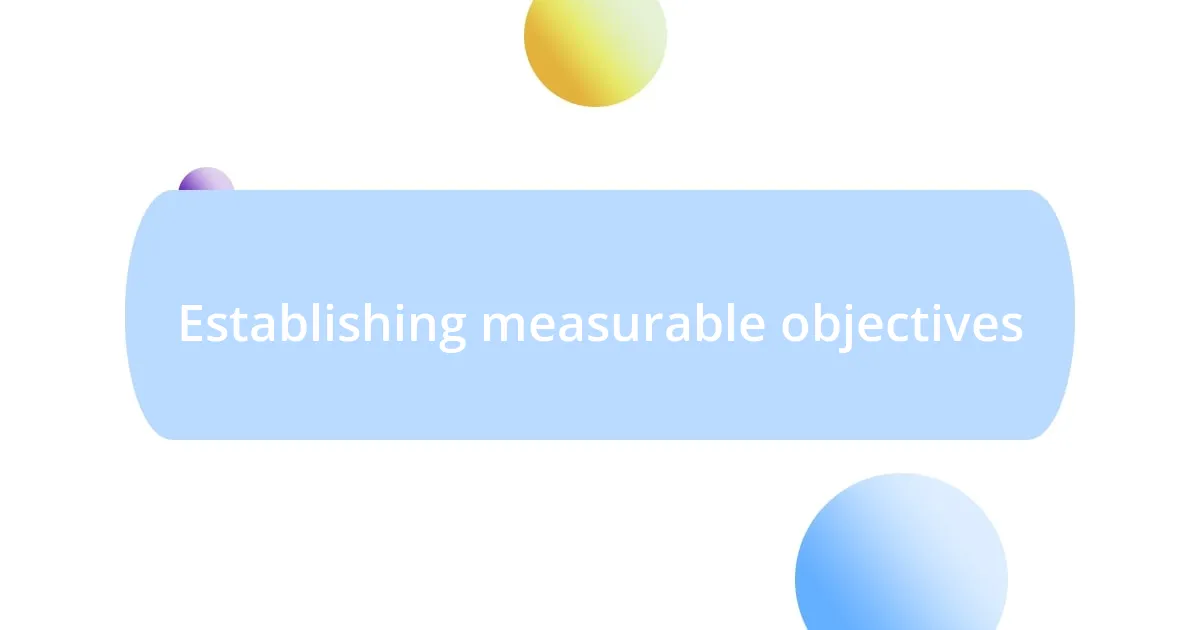
Establishing measurable objectives
Establishing measurable objectives is a crucial step in the journey toward achieving impact goals. I remember when I wanted to improve literacy rates among kids in my neighborhood. Instead of a vague goal like “increase reading,” I set a clear objective: to have 100 children read at least five books by the end of the summer. This specificity not only made my plan actionable but also allowed me to monitor progress daily.
It’s fascinating how measurable objectives create a roadmap for success. Reflecting back on my literacy project, I created weekly checklists that not only tracked the number of books read but also provided insights into which titles engaged the kids most. Did I also notice how their excitement grew as we reached milestones together? Absolutely! Every small win motivated both me and the children, reinforcing our collective spirit.
I find that breaking down larger ambitions into bite-sized, measurable goals can often reveal unexpected insights. For example, tracking engagement helped us identify the types of stories that resonated most, allowing us to adjust our approach mid-way. Have you ever discovered a surprising trend while monitoring progress? That kind of revelation can significantly enhance your effectiveness in reaching your larger vision, as it keeps the journey dynamic and your objectives aligned with real-time feedback.
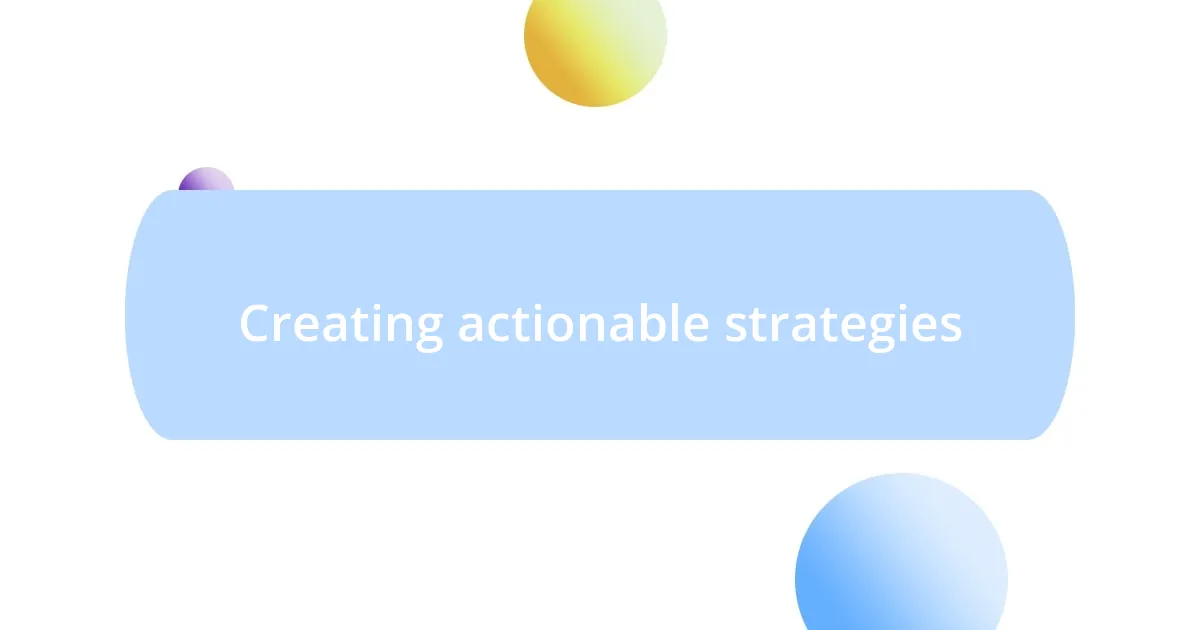
Creating actionable strategies
Creating actionable strategies requires a clear understanding of what success looks like. When I embarked on a mission to promote healthy eating in my community, I started by developing workshops focused on practical skills, like meal prep. Did I ever doubt the impact of those small, hands-on sessions? Not at all! Each workshop not only educated attendees but also built a supportive atmosphere that encouraged them to share their own culinary experiences.
It’s essential to map out specific steps that lead to achieving those measurable objectives. For example, after realizing my strategy for healthy eating needed better engagement, I decided to incorporate community cooking classes. This shift allowed participants to experiment with ingredients and taste their creations together. Have you ever felt the energy in a room when people connect through food? It’s electric! This approach not only fostered a sense of community but also made the concept of healthy eating more relatable and enjoyable.
I also find that regularly revisiting and adjusting my strategies keeps the momentum alive. In my own experience, I learned that after hosting a few cooking classes, I needed to introduce feedback sessions. This way, attendees could voice their opinions on what worked and what didn’t. How often do we overlook the input of those we aim to serve? Listening to their insights transformed my approach, allowing me to fine-tune future classes to better meet their needs, ultimately making our collective goals more attainable.
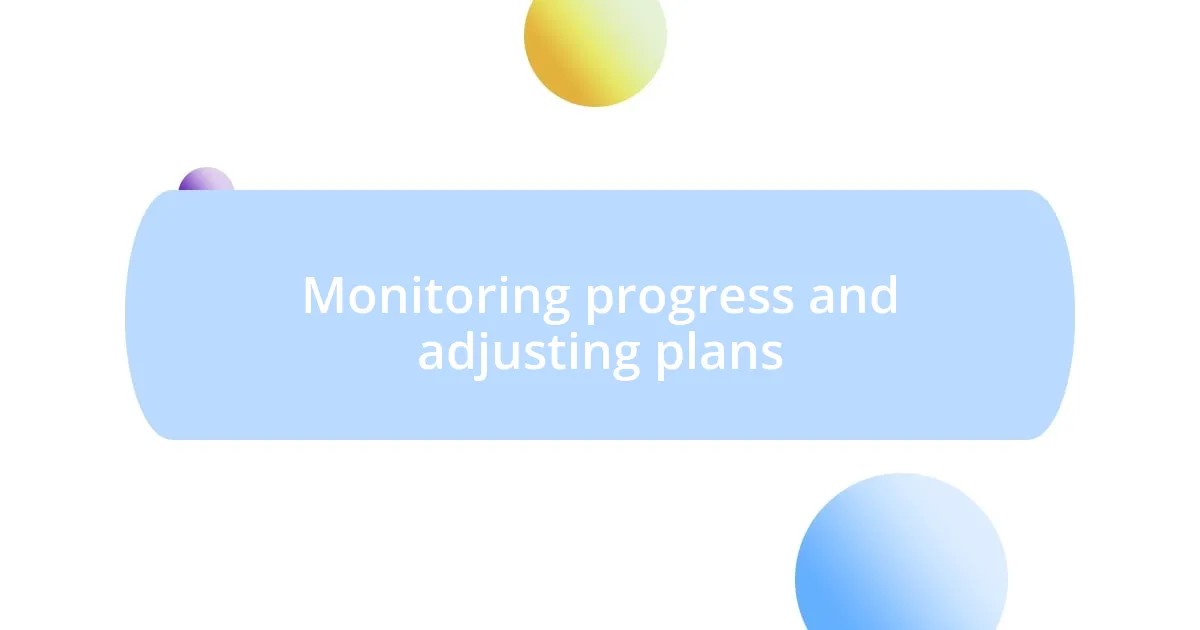
Monitoring progress and adjusting plans
Monitoring progress is where the magic truly happens. I recall a time when I took on the challenge of facilitating a community garden project. Initially, I tracked how many plants were growing and the overall health of the crops. But after a few weeks, I realized that simply counting wasn’t enough. I started keeping a journal of the participants’ involvement—who was consistently showing up and who needed encouragement. This step made the process so much richer; it wasn’t just about the garden, but also about nurturing a community. Have you ever felt motivated by simply observing your own journey?
Adjusting plans is just as important as setting them. During my garden project, I noticed that some plants thrived better in certain spots than others. Instead of sticking rigidly to my original layout, I embraced flexibility. I rearranged the garden based on what I learned. This not only improved our yields, but it also fostered a sense of collaboration as community members shared their thoughts on what might work better. Isn’t it rewarding when you realize that flexibility can lead to even greater results?
I’ve learned that regularly checking in with your goals helps you stay aligned with your vision. After a couple of months of monitoring, I held an informal gathering to discuss our progress. This open dialogue revealed swirling ideas and concerns, some I hadn’t even thought of! Listening to everyone’s experiences not only informed adjustments to our garden layout but also deepened our connections. Isn’t it incredible how collective input can shift your perspective and enhance your impact?
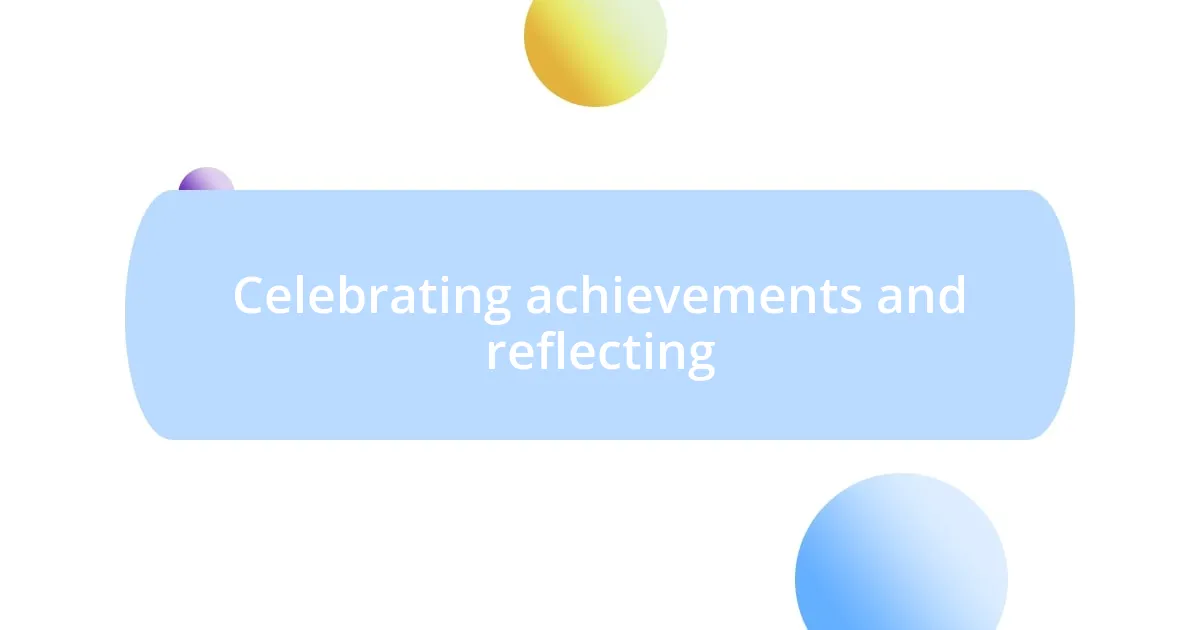
Celebrating achievements and reflecting
Recognizing and celebrating achievements, no matter how small, is vital. I remember the first time someone came up to me after a workshop and shared how the new cooking techniques had inspired them to prepare healthier meals for their family. That moment felt magical. It reminded me that all the effort we put in wasn’t just about statistics; it was about real people experiencing real benefits. Have you ever basked in the glow of someone else’s gratitude? It truly fuels the fire to keep going.
Reflection goes hand in hand with celebration. I often carve out quiet moments after completing a project to think about what worked and what didn’t. One particular evening, as I sipped on herbal tea and flipped through my notes from the cooking classes, I felt both proud and pensive. What resonated with the participants? What could I have done differently? These reflections aren’t just about patting myself on the back; they guide my future endeavors. Isn’t it fascinating how taking a step back can offer clarity that rushes forward often obscures?
Sometimes, I write down my reflections in a journal. They become a treasure trove of insights that I cherish. I recall the thrill of flipping back through those pages and seeing the growth in my strategies and impact over time. When I read comments from participants celebrating their successes, I feel a rush of warmth in my heart. It reinforces the notion that these achievements aren’t solely mine; they’re ours. How do you track your reflections? Having a record can be a powerful motivator, reminding us of our journey and the lives we touch along the way.




